New Engineer Training
Complete One-year Boarding System Training for New Technical Hires at the Technical & Skill Training Dept. Developing trainees’ skills and minds, and creating a foundation for working adults
Fuji Electric focuses on human resource development in manufacturing, as it is in the business of making products that satisfy customers in terms of such aspects as quality, cost, and deadlines. One such effort is the Technical & Skill Training Dept. attached to the Production Technology Center (Kounosu, Saitama Prefecture). This complete boarding system training facility provides a full year of training for new technical employees straight out of high school.
Holistic training (including Zen meditation and mountain climbing) that only a complete boarding system can provide
The Technical & Skill Training Dept. was moved in 2012 from its original location in the Skill Training Center in Mie Prefecture, where it was previously called the “Higher Skill Training School” (HST School). Combined with the time it was called the HST School, the Technical & Skill Training Dept. has a history stretching back 27 years. Yasuhiro Ishida, head of the Technical & Skill Training Dept., provides an overview of the facility.
“We have 57 trainees during the 2017 FY. They study five subjects: electronic devices, electrical equipment, mechanical working, precision machining, and plastic working. When training first started we used a screening system and only taught electronic devices, but the number of subjects continued to increase and training is now provided for all new technical employees straight out of high school.”
Mr. Ishida describes why.
“We consider human resource development from a medium-long-term perspective. Of course, it’s important to build a technical base for trainees to smoothly enter the workforce. But it’s also important for trainees to become aware of their roles as productive adults. If we don’t do a good job when comes to human resource development, it always shows up in product quality. We insist on training the minds, skills, and bodies of our trainees. You could say we are really involved in human development.”
Trainees begin their days with a morning jog and light calisthenics. Classes begin afterwards at 9:00 am. While training, their lives are well-regulated to develop both physically and mentally. Befitting a curriculum meant to provide spiritual development, trainees are provided with unique experiences such as Zen meditation in a temple and mountain climbing—proof that the curriculum truly does focus on holistic training.
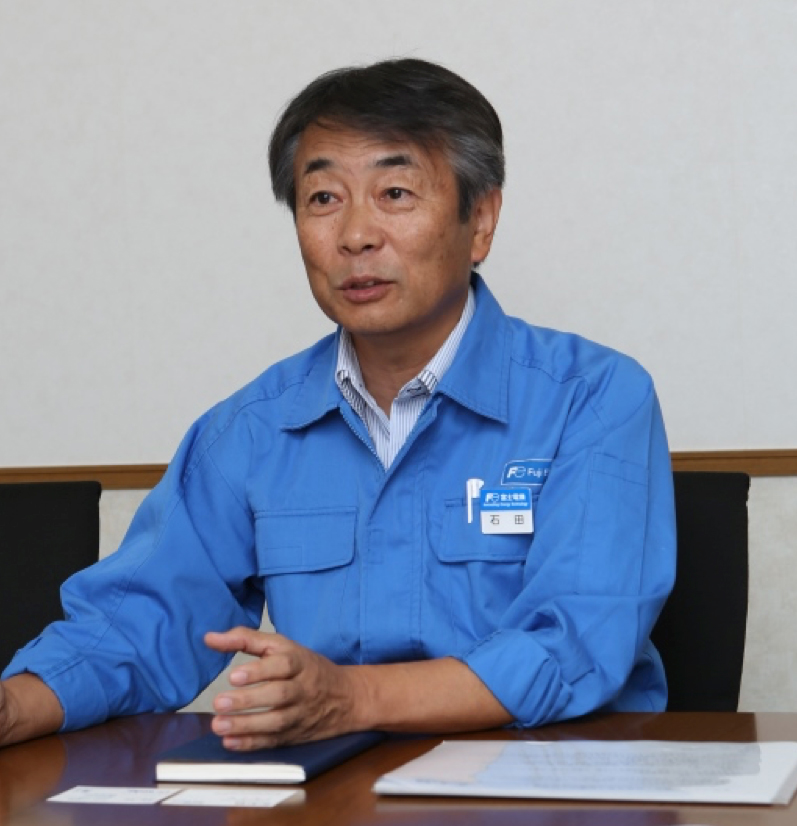
Yasuhiro Ishida, head of the Technical & Skill Training Dept.
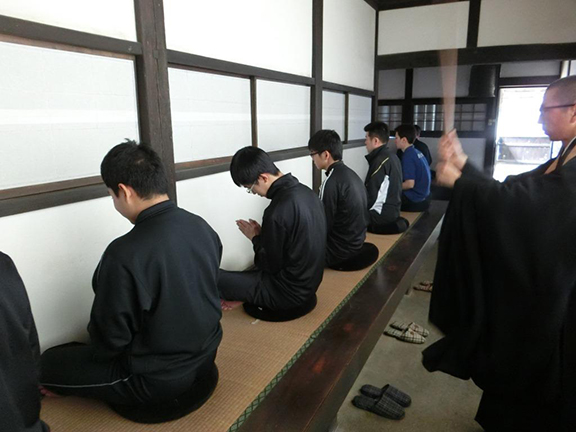
Zen meditation
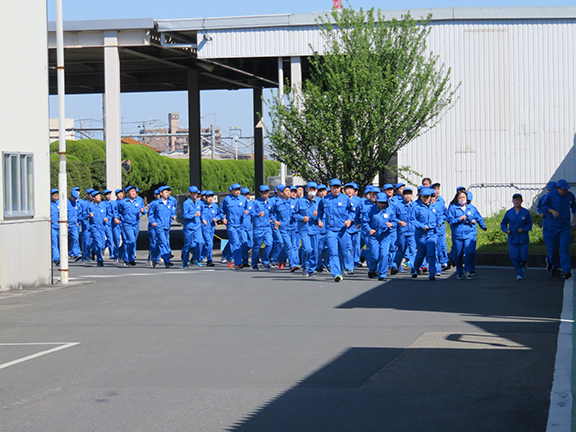
morning jog
Training to instill an awareness on quality and deadlines
“We begin by teaching trainees the absolute basics—how to greet people and dress properly, factory rules, and how to stay safe at work. Trainees tend to be nervous at first, but they loosen up once they get used to the program. It’s also important to teach them basic manners to get them on board,”
explains Yuji Kariya, Electronic Devices Training Supervisor. After entering the company, Mr. Kariya was involved in assembling printed circuit boards at the Fukiage Factory for 20 years. For the last six years he has been using that experience to teach soldering and other skills at the Technical & Skill Training Dept.
The Technical & Skill Training Dept. is a training school certified by the Ministry of Health, Labour and Welfare, and conducts 1,400 hours of regulated courses decided by the national government on topics such as safety, quality, and improvement. In order to graduate, trainees must pass a skills check (graduation exam). Trainees must also attend 400 hours of special Fuji Electric classes.
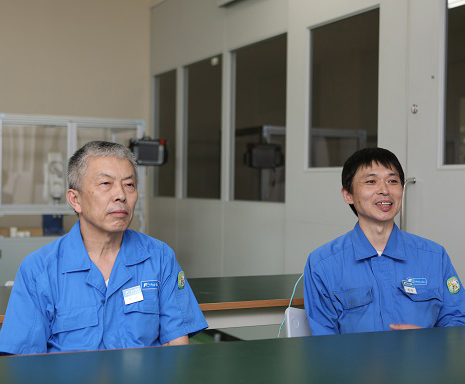
Issei Hota (Mechanical Working Training Supervisor; left) and Yuji Kariya (Electronic Devices Training Supervisor; right)
Issei Hota, Mechanical Working Training Supervisor, who has 30 years of experience in the metal mold manufacturing field, wants to teach young technicians the spirit of Fuji Electric manufacturing.
“In the factory, all that matters is your results. If you fail, your product is a defect. I can sometimes sound strict when I am talking to trainees, but that’s just so that they understand how strict work in the field is.”
For a test at school, you would pass with a score of 60 or 70. When manufacturing products, however, you always need to get a score of 100. Mr. Hota continues,
“once you can get a score of 100, you then look up and see there’s so much more to do. That’s what makes manufacturing rewarding.”
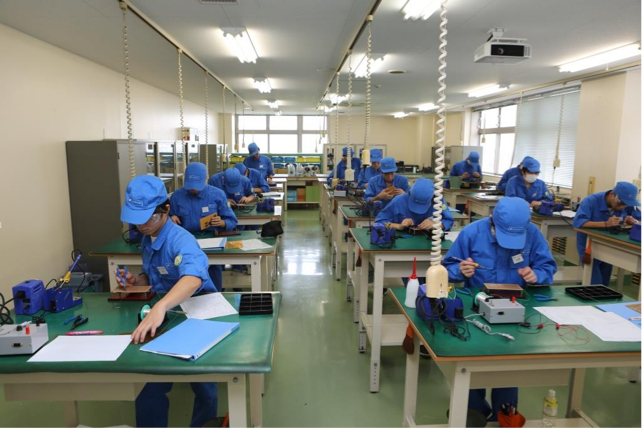
Soldering printed circuit boards
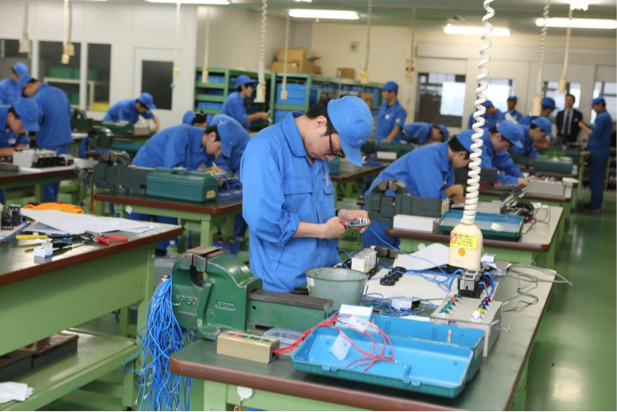
Wiring
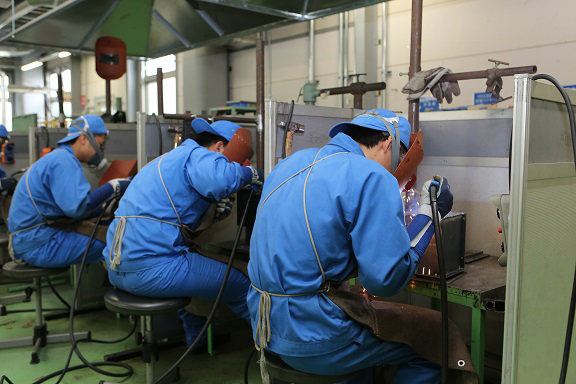
Welding
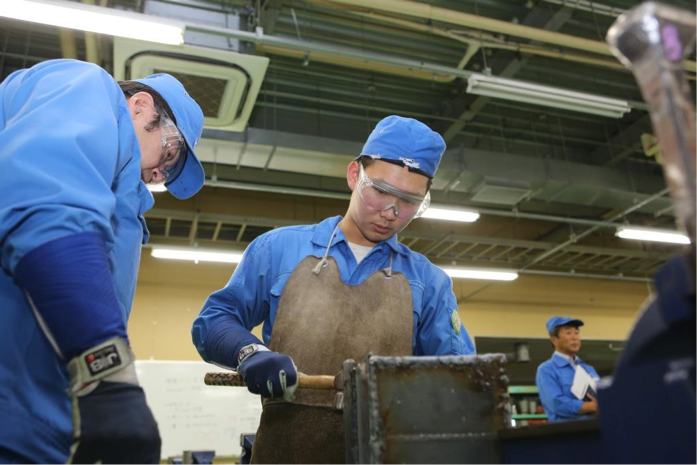
Proficiency develops future masters
Massive changes in skill and attitude
“I thought living in a dorm would be great because I could live on my own. I didn’t really think too much about it,” explained Norika Kondo, a trainee originally from Nagano Prefecture studying electronic devices. Ms. Kondo decided to follow in her older sister’s footsteps and join Fuji Electric. However, she was also worried. Most trainees are graduates from technical school, but Ms. Kondo graduated from a business school. She was worried about keeping up with the technical aspects of her training. However, she felt relieved when she heard from trainers that others trainees from non-technical schools were able to learn a lot and graduate.
“I decided to keep asking the trainers about anything I didn’t understand. I feel a little bit more sure of myself now. I’m happy to be given the chance to really learn from the basics. I think this will be a great year for me.”
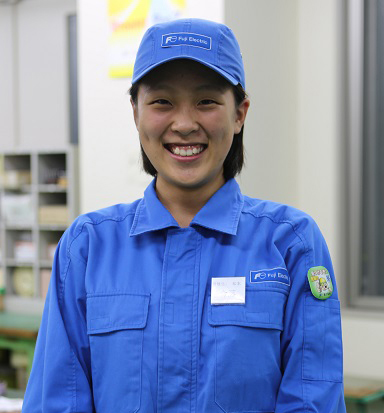
Norika Kono (Electronic Devices)
The importance of learning straight from experienced workers
Yuki Yamashita is a trainee originally from Chiba Prefecture studying mechanical working. Having graduated from a technical school, Mr. Yamashita has had experience handling machine tools. However, he says that his training here has made a big change in his frame of mind.
“If you fail, you’ve just wasted the material and you’ve just added some cost. If you don’t notice a defect, it will just lead to trouble in some process down the line. This is especially true with milling machines, which I’m studying now. Working with these machines requires concentration, as problems are not easy to fix later on. I’ve realized that I wasn’t as concerned as I needed to be with the quality of my work until now.”
Mr. Yamashita explains that the trainers helped him to realize this.
“I’m so happy to have the chance to learn from others who have dozens of years of experience in the field. You can learn techniques and concepts that are actually used in the field. I learn something new everyday, as I have to figure out what the process I’m thinking of differs from what the trainer is teaching me.”
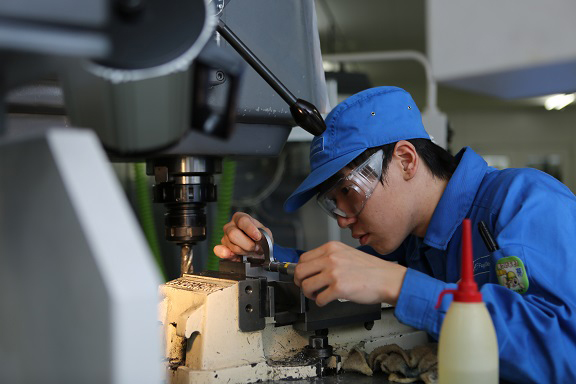
Mechanical working
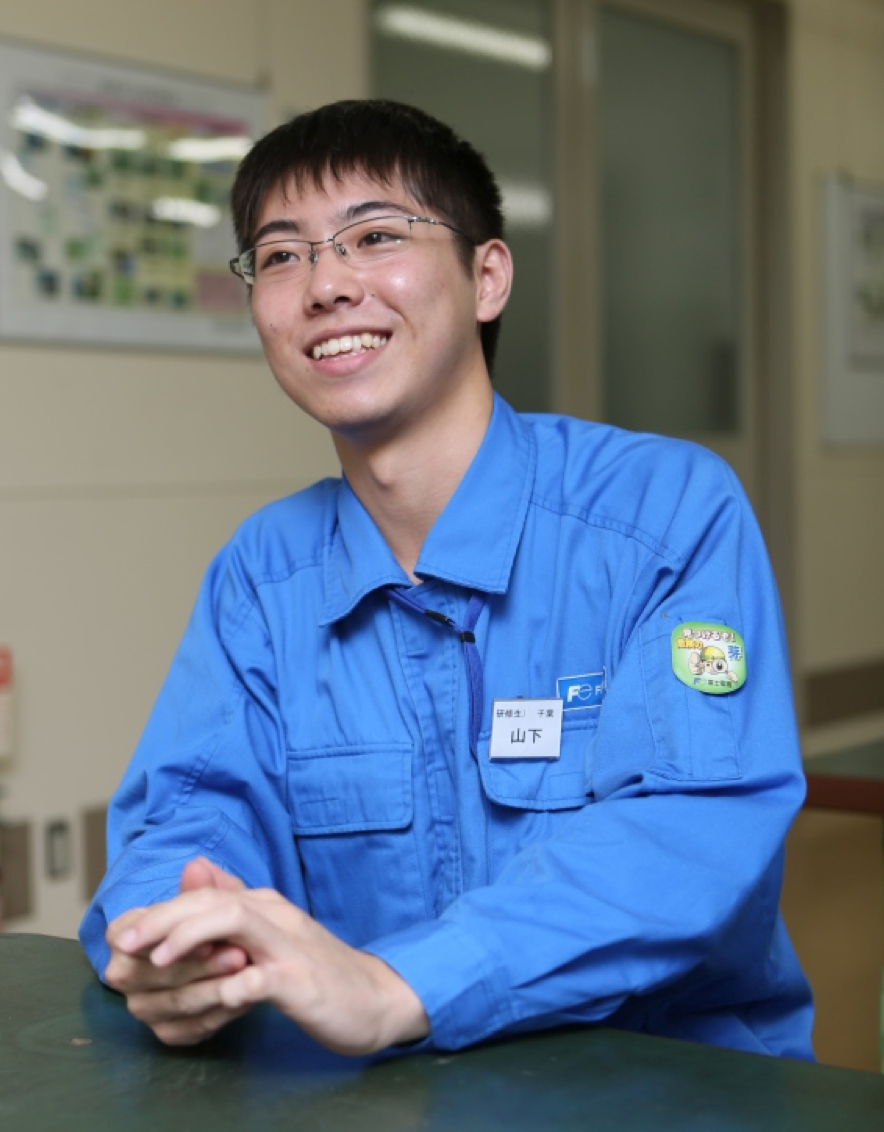
Yuki Yamashita (Mechanical Working)
Learning the spirit of manufacturing—where quality truly comes from
We then asked Mr. Ishida, head of the Technical & Skill Training Dept., to explain the rest of the training process.
“Once trainees pass their skills check, they form teams and start working on their graduation projects. Team members are carefully selected so that all five subjects are covered. As they discuss their project, team members use what they’ve learned to inject a little levity and create something. Every year in April, I start to feel the nervousness of being entrusted with these employees for a year. I am always truly pleased when everyone finishes their projects safe and sound and I get to see what they’ve made.”
The Technical & Skill Training Dept. represents a model of a manufacturing site in which employees work as a team to make things. Having learned a little bit of the spirit of manufacturing, trainees then go off to begin their careers. This is where Fuji Electric quality truly comes from.
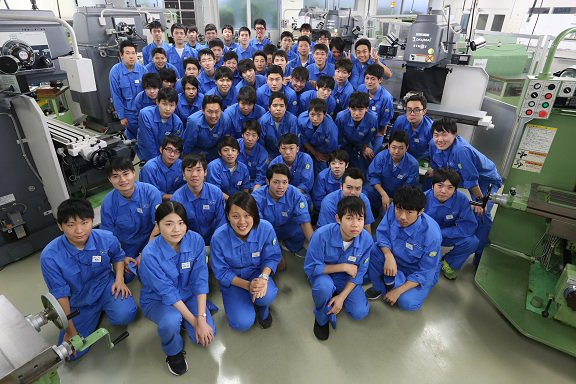
■See below for the Fuji Electric “Basic Concept of Human Resource Development” and “Education/Training Systems.”
https://www.fujielectric.com/company/csr/society/with_employee/training.html


